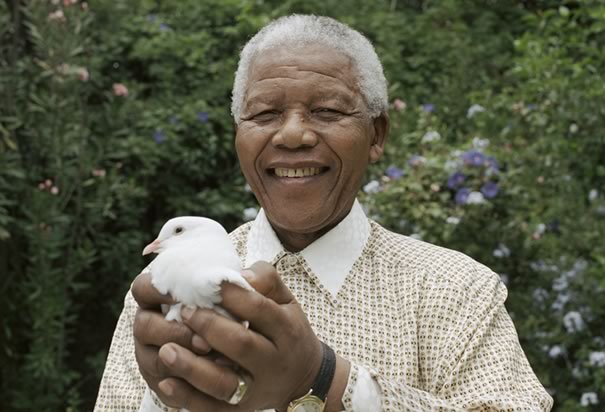In PricewaterhouseCoopers’ global survey of 1,330 chief executive officers in 68 countries late last year, Nelson Mandela ranked fourth after Winston Churchill, Steve Jobs and Mahatma Gandhi on a list of the world’s top-ten most admired leaders.
The survey said many CEOs “chose leaders who were persistent in the face of adversity – as well as transformational leaders and leaders who did ‘the right thing’.”
Nelson Mandela, the anti-apartheid lawyer-warrior who emerged from 27 years of prison to became South Africa’s first Black president, died today at the age of 95 after months of poor health.
Elected president in May 1994, a position he held until 1999, he oversaw the dismantling of the apartheid system grounded in white supremacy, for which he was awarded the Nobel Peace Prize in 1993.
At the time of his death, Mandela had become a global brand that was estimated to be worth millions of dollars. His personal net worth at the time of his death has been estimated at $245 million.
The smiling image of Madiba, the tribal name by which South Africans affectionately refer to Mandela, adorns all sorts of memorabilia, from t-shirts and placemats to banknotes and even salt and pepper shakers. There’s also a collection of wines from the “House of Mandela” and a clothing line branded with his prison number or an image of his hand.
Even Viagra tried to cash in on the Mandela brandwagon. On the eve of Mandela’s 90th birthday, the company unveiled a commercial that trumpeted, “Madiba turns 90, Viagra turns 10.” The commercial flopped on a wave of public outrage.
On March 24, 1994, 34 days before the election that brought him and his once-banned African National Congtressinto government, Mandela addressed business leaders in Cape Town, Nervous about the future under Black leadership, the captins of business had invited him to speak about his plans for the country, for Cape Town (where the apartheid government maintained that Blacks had no right to live), and particularly for the business community.
“To build a better life for everyone in the country requires a clear plan. It also requires that we rise above the narrow interests and do what is best for the country,” Mandela told them. “We have to harness our resources in ways that will ensure that our economy grows and creates jobs and opportunities for all South Africans.”
His plan to do so rested on four pillars: A democratic society based on equality, non-racialism and non-sexism; a nation built by developing its different cultures, beliefs and languages as a source of common strength; growing the economy by providing jobs, housing and education; and a peaceful and secure environment in which people can live without fear.
His priorities, Mandela emphasized, were the “three central economic problems in South Africa that need to be addressed: High unemployment, with an estimated 47 percent of the country’s economically active population unable to find work in the formal sector of the economy, and 200 000 entering the job market each; low levels of investment, low productivity of investment and low growth rates; and income distribution that “is terribly skewed towards whites.”
“In tackling these problems, the creation of jobs and the development of a healthy environment for business opportunities must be key. We will create an environment conducive to both foreign and domestic investment through stable, consistent and predictable policies,” Mandela said.
He outlined the four key elements of his job-creation program.
1. A national public works program that would provide employment and training for about 2.5 million people over 10 years, building roads, providing water, electricity, schools, clinics, housing, and meeting other needs.
2. Enhanced opportunities for small businesses by making it easier for people to start their own business through less burdensome licensing laws; training, access to loans, and assistance for women entrepreneurs.
3. Restructuring industries – particularly mining, textiles and metals — to be more viable and internationally competitive in the 21st century; ensuring labor stability and greater productivity through skills training and basic adult education; and ensuring greater cooperation between business, government, and labor.
4. Rural land reform to decrease urban migration and poverty by utilizing arable state land, and land that is not being used. Government would train those who wished to know how to use land effectively, and would make markets and credit more available.
“We will not allow corruption!…We want to ensure that the government does not lose touch with the people,” Mandela promised. “As business people you should be taking the lead. As entrepreneurs, you need to demonstrate the confidence that our country holds great opportunity.”
Nearly 20 years later, South Africa is the strongest, albeit slowing, economy on a continent that is home to some of the world’s fastest growing economies. South African companies are investing across the continent, touting themselves as pan-African enterprises.
For many, however, there is discontent. The vision of economic freedom and equitable income distribution that Mandela outlined to the Cape business leaders remain just that – a vision. Crime and anti-white sentiment are on the rise in the wake of glaring economic inequities, rising food prices, high inflation and high youth unemployment. The number of unemployed rose to 4.7 million in the second quarter of 2013, about a quarter of the labor force and the highest since the government started the survey in 2008, Reuters reports.
Add to the mix a lack of progress on labor market reform and in attracting investment into the country, which, some speculate, will keep growth to about 2.5 percent to 3 percent for years to come, instead of the 5 percent that the Reserve Bank says is needed to make inroads into joblessness.
All this, plus recurring corruption scandals, have called into question the quality of today’s ANC’s leadership.
As Nelson Mandela struggled with his waning health over the last several months, he must have reflected on the South Africa he envisioned, and promised, under ANC governance in 1994.
“Numerous economic cooperation agreements have been concluded as a result of the ANC`s credibility with foreign governments and the goodwill we have developed towards South Africa,” he told the Cape Town business leaders back then. “No other political party in South Africa has the legitimacy and the credibility of the ANC. Only the ANC has the authority to pull South Africa from the mess that we are emerging from today.”
Mandela departs this world a model of moral authority, bequeathing it a leadership legacy for the conduct of politics, business and social engagement.













